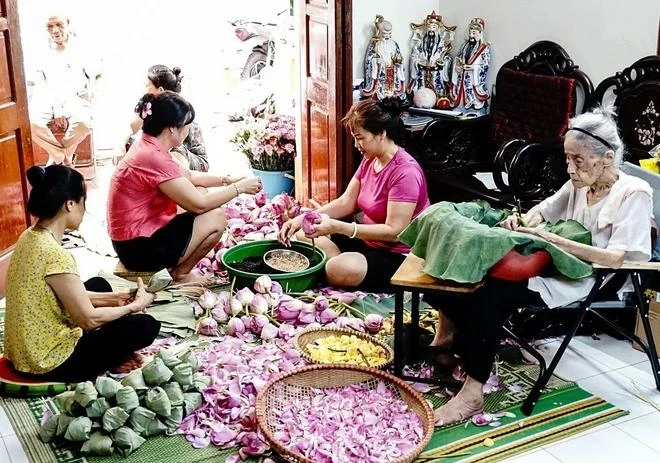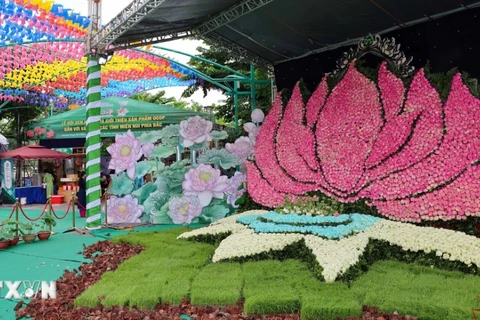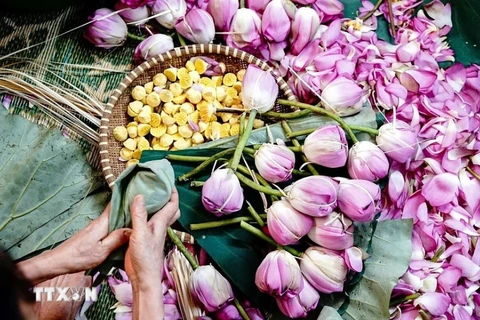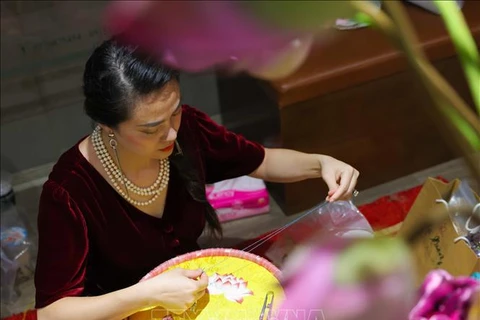
Hanoi (VNA) – Hanoi is promoting the farming of lotus and the production of lotus products in association with tourism development given the plant's values, with a focus on craft villages making products from lotus.
Vice Chairman of the Hanoi People's Committee Nguyen Manh Quyen said that for Vietnamese, lotus symbolises purity, and is an endless source of inspiration for poetry, literature, music and arts. But besides its spiritual and cultural values, the plant has many practical uses in daily life.
Luu Thi Hien, owner of Hanoi’s famous lotus-scented tea Hien Xiem in Tay Ho district, said her family has passed down the tradition of making lotus tea for many generations.
In the past, the elderly made lotus tea to drink only at home, for entertaining guests, and as gifts for holidays and Lunar New Year (Tet). With the development of the market economy, many people seek lotus tea as a specialty of Hanoi, she said, adding that the increased demand drove her to expand her family business.
According to her, it takes about 1,500 lotus flowers to make 1kg of lotus tea, along with high-quality tea so its price is very expensive, even up to tens of millions of Vietnamese dong, not to mention labour costs.
This type of tea doesn’t have too strong taste yet the floral aroma in the tea is very fresh and pleasant, Hien noted.
La Quang Khanh, Director of Me Linh Lotus Cooperative, said the cooperative currently has 50ha under lotus, mostly the white lotus and Bach Diep (thousands of petals) lotus varieties that originated from the old varieties that grew in the West Lake.
From May-September, the cooperative harvests and supplies 8,000 to 10,000 lotus flowers daily to the market, he added.
He said lotus flowers and lotus tea produced by the cooperative have been recognised as three-star and four-star OCOP products and have been introduced at many trade fairs and events both in and outside Hanoi. The cooperative also plans to put on the market two new products - lotus tea bags and lotus leave tea at the end of this year.
Nowadays, lotus plants are being cultivated in several Hanoi suburban districts for eco-tourism development. The lotus plant and its parts are raw material for textile and fragrance and starch processing. Among these, there is the "one-of-a-kind" lotus silk produced by artisan Phan Thi Thuan, or the savoury food dishes made from different parts of the lotus plant by villagers in the ancient Duong Lam Village – all are unique tourism products that attract many visitors.
Currently, Hanoi has 600 hectares of lotus, mostly in suburban districts. The city aims to expand lotus cultivation to 900ha by 2025. Eighteen lotus-based products have been evaluated and ranked under the One Commune One Product (OCOP) Programme of Hanoi.
According to Associate Professor Dang Van Dong from the Fruit and Vegetable Research Institute (FVRI) under the Ministry of Agriculture and Rural Development, there are three prominent varieties of lotus flowers in Vietnam, equivalent to its three regions. The South has the pink Dong Thap lotus; the Central region has the white Hue lotus and the north has the Bach Diep Ho Tay lotus. Notably, the Bach Diep lotus is classified as a rare and special genetic resource that needs to be conserved and developed.
To restore and expand this lotus variety, the Hanoi Department of Agriculture and Rural Development has coordinated with the FVRI and Tay Ho District People's Committee to jointly implement a project "Building a model of lotus cultivation associated with the development of ecotourism in line with the value chain in Tay Ho - Hanoi."
Nguyen Dinh Hoa, the department’s Deputy Director said the Agricultural Extension Centre was assigned to cooperate with FVRI to pilot the farming of more than 30 new lotus varieties in Hanoi.
Nearly 20 of these varieties have been selected for their adaptability to Hanoi's soil conditions, with higher quality and yield.
Thanks to the scientific and technological advancement, Hanoi now boasts many new lotus varieties, extending the lotus season from April to November, he added./.






















